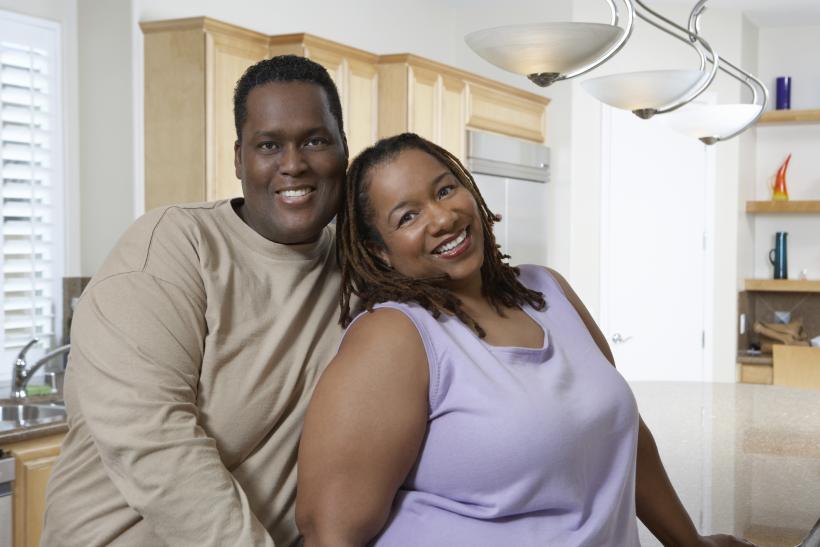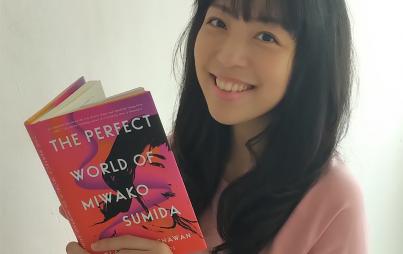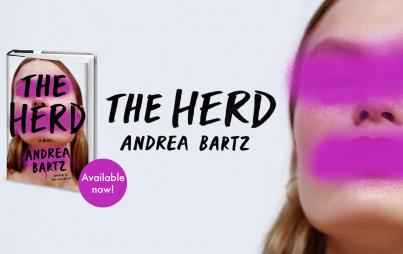
"Having a partner does offer a certain amount of comfort and validation, but doing the intense external work around body acceptance has been less pressing for me in that context." Image: Thinkstock
It's more common for fat-positive writers and activists — particularly women — to be coupled. There's Lindy West and Ahamefule J. Oluo. Kate Harding and Al Iverson. Lesley Kinzel and Dennis Scimeca.
In fact, it was Kate Harding’s blog post “On Dumb Luck” which sparked my observation:
I’ve noticed that a lot of the people I see writing confidently and persuasively about body acceptance are married or in solid long-term relationships… my god, it is hard to develop that confidence when you’re single and not happy about it, and the whole world is telling you the way to fix that is to make yourself prettier — and, of course, that a crucial component of becoming prettier is becoming as thin as you can possibly be, by any means necessary.
Of course, Harding wrote this back in 2007. I wanted for things to be different ten years later. I decided to talk to other fat activists — coupled and single — to see what they thought.
Nomy Lamm is a longtime fat activist who wrote the zine I’m So Fucking Beautiful in 1991 — and she continues to speak out on issues of body acceptance, disability and feminism. She told me,
In my experience, doing the work of body acceptance, self-love and fat liberation was a prerequisite to me being able to be open to looking for and finding partners who I feel seen and respected by.
In fact, almost everyone I’ve ever dated has known who I was from my art and activism before we hooked up. It's a good filter — in the situations where that hasn't been the case, it's been harder for me to trust or open up because there can be a painful learning curve.
Having a partner does offer a certain amount of comfort and validation, but doing the intense external work around body acceptance has been less pressing for me in that context.
Sonya Renee Taylor has been writing about bodies since 2003. Her work explores personal narrative as access to universal themes of humanity and how personal narrative intersects with political, structural and systemic oppression. She’s also founder and CEO of The Body is Not an Apology, which fosters radical, unapologetic self-love. She says,
As a queer woman, I found community in my relationships with other women who were fat. We were able to affirm each other and our bodies.
I had a reflection of a body I found beautiful that was in many ways similar to my own body. It reminded me that I could see my body in the way I saw my partners.
With cis male partners, the good ones were loving and found me holistically desirable; the crappy ones fetishized me.
I asked Taylor if it was less taxing to be privately supported by a partner. She replied,
I don't think this is specific to fat activism. Having a place of refuge while tackling hate and oppression in the world is valuable. Being reminded by someone that you are loved and desired in a world that is constantly telling you “You are not, really,” allows for a place of healing. When the world barrages you with hate, it is healing to have a reminder that you are loved.
The drawbacks of being partnered is often that your partner will find themselves in the line of fire. Many hate trolls will dox (find your personal and work information and post it publicly online) your partner to attack you.
Being single is simply hard because after a day of fighting violence and oppression, it is nice to have a warm kind body to rest beside.
My body positivity journey has led to greatly improved mental and emotional health, but [for others] that barely registers in comparison with our society’s ultimate proof-of-a-woman’s-value: a man’s love. After all, our culture seems to support the idea that the “white dress holy grail” might be worth a little disordered eating and body hatred.
Leah Berkenwald’s blog post “My Breakup With Exercise” was highlighted on Wordpress’ “Freshly Pressed.” Berkenwald is a college health professional promoting body positivity and the Health at Every Size philosophy as a vehicle for holistic mind-body-spirit wellness.
When asked if there are any drawbacks to being a single fat activist, she said, “I worry that being a single fat activist gives me less credibility; that people out there believe I am single because I am fat, and are afraid that accepting their own bodies will prevent them from finding love." She added:
My body positivity journey has led to greatly improved mental and emotional health, but [for others] that barely registers in comparison with our society’s ultimate proof-of-a-woman’s-value: a man’s love.
After all, our culture seems to support the idea that the “white dress holy grail” might be worth a little disordered eating and body hatred.
My perspective is very heterocentric and I can't really speak to how these dynamics manifest for LGBTQ fat activists. But in my experience, body image is so tied in with dating and attraction that people often need reassurance that embracing body positivity won’t make them undatable before they’re even willing to explore the idea.
Ragen Chastain started danceswithfat.org in 2009; her work is a discussion of the concepts of Size Acceptance and Health at Every Size, looking at everything from pop culture to research from an intersectional perspective. She says,
It's possible for someone to want to date me — and to love me and my fat body — but not to support understand the choice to be an activist, and that's really difficult.
My partner is a fat activist herself and that is incredible because she understands where I'm coming from and why it's important to me, and she is phenomenally supportive of my work. As a bonus we can also do projects together.
But it’s not always easy to bear witness to the personal attacks directed at her partner as a result of writing at Dances With Fat.
It's not my partner's fault at all, but I have a lot of active Internet trolls (there are several online forums and websites with thousands of followers devoted to hating me specifically).
I'm used to it and I can deal with it, but when they go after my partner — even though she can totally handle it and never complains — it's still hard for me to think that my activism is bringing that kind of hate and cruelty into her life as well.
It's difficult to write about the body, particularly if you’re a woman or non-binary writer who takes up space in a fat body — and yes, having the support of a partner who desires and accepts you as-is goes a long way. But maybe the path to finding those partners has to begin with desiring and accepting ourselves.
Maybe we have to write and struggle, go on bad dates, fuck and run, fight the trolls, laugh with our friends.
Maybe then, we get to find all kinds of love.







